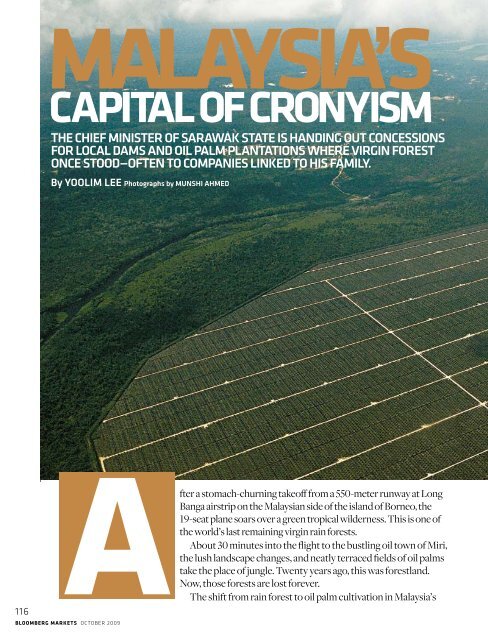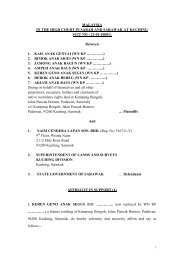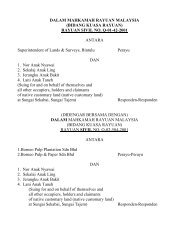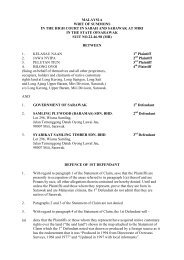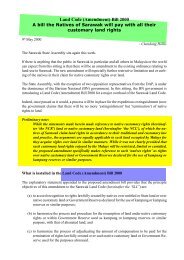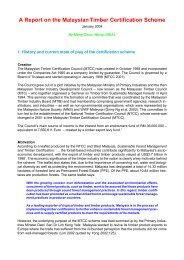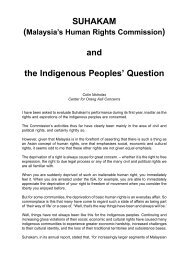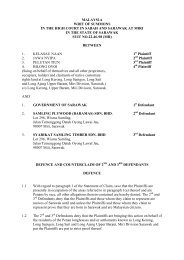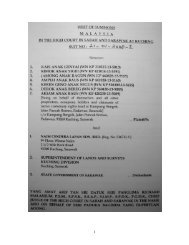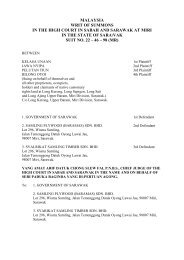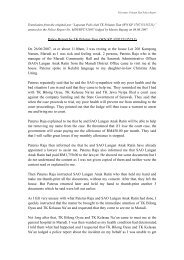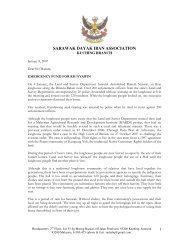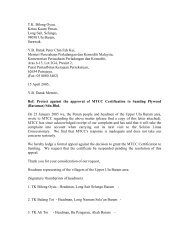Malaysia's capital of cronyism - Rengah Sarawak
Malaysia's capital of cronyism - Rengah Sarawak
Malaysia's capital of cronyism - Rengah Sarawak
You also want an ePaper? Increase the reach of your titles
YUMPU automatically turns print PDFs into web optimized ePapers that Google loves.
Malaysia’s<br />
Capital <strong>of</strong> <strong>cronyism</strong><br />
The chief minister <strong>of</strong> <strong>Sarawak</strong> state is Handing out concessions<br />
for local dams and oil palm plantations where virgin forest<br />
once stood—<strong>of</strong>ten to companies linked to his family.<br />
By Yoolim Lee Photographs by MUNSHI AHMED<br />
116<br />
fter a stomach-churning take<strong>of</strong>f from a 550-meter runway at Long<br />
Banga airstrip on the Malaysian side <strong>of</strong> the island <strong>of</strong> Borneo, the<br />
19-seat plane soars over a green tropical wilderness. This is one <strong>of</strong><br />
the world’s last remaining virgin rain forests.<br />
About 30 minutes into the flight to the bustling oil town <strong>of</strong> Miri,<br />
the lush landscape changes, and neatly terraced fields <strong>of</strong> oil palms<br />
take the place <strong>of</strong> jungle. Twenty years ago, this was forestland.<br />
Now, those forests are lost forever.<br />
AThe shift from rain forest to oil palm cultivation in Malaysia’s<br />
bloomberg markets October 2009
<strong>Sarawak</strong> state highlights the struggle taking place between<br />
forces favoring economic development, led by <strong>Sarawak</strong> state’s<br />
chief minister, Abdul Taib Mahmud, and those who want to<br />
conserve the rain forest and the ways <strong>of</strong> life it supports. During<br />
Taib’s 28-year rule, his government has handed out concessions<br />
for logging and supported the federal government’s<br />
megaprojects, including the largest hydropower site in the<br />
country and, most recently, oil palm plantations. The projects<br />
are rolling back the frontiers <strong>of</strong> Borneo’s rain forest, home to<br />
nomadic people and rare wildlife such as orangutans and proboscis<br />
monkeys. At least four prominent <strong>Sarawak</strong> companies<br />
that have received contracts or concessions<br />
have ties to Taib or his family.<br />
The government <strong>of</strong> Malaysia plans to<br />
transform the country into a developed<br />
nation by 2020 through a series <strong>of</strong> projects<br />
covering everything from electric<br />
The landscape <strong>of</strong><br />
<strong>Sarawak</strong> is<br />
changing from<br />
rain forest into<br />
oil palm<br />
plantations.<br />
power generation to education. The country’s gross domestic<br />
product, which has been growing at an average 6.7 percent annual<br />
pace since 1970, shrank 6.2 percent in the first quarter.<br />
In <strong>Sarawak</strong>, Taib’s government is following its own development<br />
plans that call for doubling the state’s GDP to 150 billion<br />
117<br />
October 2009 bloomberg markets
118<br />
ringgit ($42 billion) by 2020. <strong>Sarawak</strong> Energy Bhd., which is 65<br />
percent owned by the state government, said in July 2007 it<br />
plans to build six power plants, including hydropower plants and<br />
coal-fired plants. The state government also wants to expand the<br />
acreage in <strong>Sarawak</strong> devoted to oil palms to 1 million hectares<br />
(2.5 million acres) by 2010, from 744,000 at the end <strong>of</strong> 2008,<br />
according to <strong>Sarawak</strong>’s Ministry <strong>of</strong> Land Development. Companies<br />
that formerly chopped down hardwood trees and exported<br />
the timber are now moving into palm plantations. Meanwhile,<br />
many <strong>of</strong> the ethnic groups who have traditionally lived from the<br />
land in <strong>Sarawak</strong>—known as Dayaks—have filed lawsuits that aim<br />
to block some projects and seek better compensation.<br />
<strong>Sarawak</strong>’s chief minister is also<br />
finance minister and planning and<br />
resources management minister—which<br />
gives him the power to dispense land,<br />
forestry and palm oil concessions.<br />
<strong>Sarawak</strong>’s ambitions could be hindered by a lack <strong>of</strong><br />
good governance, which would shut out overseas investors,<br />
says Steve Waygood, head <strong>of</strong> sustainable and<br />
responsible investment research at Aviva Investors in<br />
London, which manages more than $3 billion in sustainable<br />
assets. “Even just the perception <strong>of</strong> corruption can lead to<br />
restricted inflows <strong>of</strong> <strong>capital</strong> from the global investment community<br />
into emerging markets such as <strong>Sarawak</strong>,” says Waygood,<br />
who wrote about reputational risk in a 2006 book, Capital<br />
Market Campaigning (Risk Books). “The largest and most<br />
responsible financial institutions are very careful to avoid funding<br />
unsustainable developments,” he says.<br />
Unilever NV, which buys 1.5 million tons <strong>of</strong> palm oil a<br />
year—4 percent <strong>of</strong> the world’s supply—for use in products<br />
such as Dove soap and Flora margarine, announced in May<br />
that it would buy only from sustainable sources. “Unilever<br />
Fading Forest<br />
Logging, oil palm plantations and mega development<br />
projects are fast rolling back <strong>Sarawak</strong>’s frontiers.<br />
VIETNAM<br />
South China Sea<br />
BRUNEI<br />
M A L A Y S I A<br />
SINGAPORE<br />
BORNEO<br />
I N D O N E S I A<br />
Kuching<br />
Kampung Rejoi<br />
Kampung Lebor<br />
Source: Digital Wisdom<br />
bloomberg markets October 2009<br />
Miri<br />
SARAWAK<br />
Long Kerong<br />
Baram River<br />
Long Banga airstrip<br />
Bakun Dam<br />
does not source any palm oil directly from <strong>Sarawak</strong>,” says Jan<br />
Kees Vis, Unilever’s director <strong>of</strong> sustainable agriculture. “We<br />
buy from plantation companies and traders located elsewhere.”<br />
He says Unilever has committed by 2015 to buy all <strong>of</strong><br />
its palm oil from sources certified by the Roundtable on Sustainable<br />
Palm Oil, a group representing palm oil producers,<br />
consumers and nongovernmental organizations that seeks to<br />
establish standards for sustainably produced palm oil. Malaysia<br />
is a member <strong>of</strong> the RSPO.<br />
About 35 percent <strong>of</strong> the world’s cooking oil comes from<br />
palm—more than any other plant, according to the U.S. Department<br />
<strong>of</strong> Agriculture. And 90 percent <strong>of</strong> the world’s palm<br />
oil comes from Malaysia and neighboring Indonesia. The oil is<br />
an ingredient used in everything from Skittles candy to Palmolive<br />
soap to some kinds <strong>of</strong> biodiesel fuel. Palm oil futures have<br />
climbed 45 percent this year as <strong>of</strong> Aug. 10 on concern that dry<br />
weather caused by El Nino may reduce<br />
output. Crude oil prices rose to a fiveweek<br />
high <strong>of</strong> $72.84 a barrel, spurring<br />
demand for biodiesel.<br />
Malaysia lost 6.6 percent <strong>of</strong> its forest<br />
cover from 1990 to 2005, or 1.49 million<br />
hectares, the most-recent data available<br />
from the United Nations Food and Agriculture<br />
Organization show. That’s an area<br />
equivalent to the state <strong>of</strong> Connecticut.<br />
Neighboring Indonesia lost forestland at<br />
the fastest annual rate among the world’s<br />
44 forest nations from 2000 to 2005, Amsterdam-based<br />
Greenpeace says.<br />
“Palm oil is the new green gold after<br />
timber,” says Mark Bujang, executive director<br />
<strong>of</strong> the Borneo Resources Institute<br />
in Miri, a city <strong>of</strong> about 230,000 people in<br />
<strong>Sarawak</strong>. “It has become the most destructive<br />
force after three decades <strong>of</strong> unsustainable<br />
logging.”<br />
While Malaysia’s palm oil exports have<br />
more than doubled to a record 46 billion<br />
ringgit in 2008 from 2006, according to<br />
the country’s central bank, the gain has<br />
come at a price. Development projects<br />
and palm plantations have displaced<br />
thousands <strong>of</strong> people, some <strong>of</strong> whom have<br />
lived for centuries by fishing, hunting and<br />
farming in the jungle. Almost 200 lawsuits<br />
are pending in the <strong>Sarawak</strong> courts<br />
relating to claims by Dayak people on<br />
lands being used for oil palms and logging,<br />
according to Baru Bian, a land rights<br />
lawyer representing many <strong>of</strong> the claimants. A<br />
handful <strong>of</strong> activists have been found dead<br />
under mysterious circumstances or disappeared,<br />
including Swiss environmental
activist Bruno Manser, who vanished in the jungle in 2000.<br />
Cutting down rain forests to cultivate palms in <strong>Sarawak</strong> has<br />
consequences far beyond Malaysia, says Janet Larsen, director<br />
<strong>of</strong> research at the Washington-based Earth Policy Institute. The<br />
forests that are being destroyed help modulate the climate because<br />
they remove vast stores <strong>of</strong> carbon from the atmosphere.<br />
Chopping down the trees ends up releasing greenhouse gases.<br />
“These last remaining forests are the lungs <strong>of</strong> the planet,” Larsen<br />
says. “It affects us all.”<br />
Chief Minister Taib, 73, has multiple<br />
roles in <strong>Sarawak</strong>. He’s also the state’s finance<br />
minister and its planning and resources<br />
management minister—a role<br />
that gives him the power to dispense land,<br />
forestry and palm oil concessions as well<br />
as the power to approve infrastructure<br />
Logging, right, is<br />
giving way to palm<br />
cultivation, below.<br />
The <strong>Sarawak</strong> state<br />
wants to double palm<br />
oil plantation land by<br />
2010 from 2006.<br />
119<br />
October 2009 bloomberg markets
120<br />
projects. Until last year, Taib held the additional role <strong>of</strong> chairman<br />
<strong>of</strong> the <strong>Sarawak</strong> Timber Industry Development Corp., which<br />
fosters wood-based industries in the state.<br />
Anwar ibrahim, the former Malaysian finance minister<br />
who’s the head <strong>of</strong> the country’s opposition alliance,<br />
sees parallels between Taib’s rule and those <strong>of</strong> other<br />
long-standing leaders in Southeast Asia, such as former<br />
Indonesian President Suharto and former Philippine leader Ferdinand<br />
Marcos. “It’s an authoritarian style <strong>of</strong> governance to protect<br />
their turf and their families,” says Anwar, who was fired as deputy<br />
prime minister by then Prime Minister Mahathir Mohamad in<br />
1998 and jailed on charges <strong>of</strong> having homosexual sex and abusing<br />
power. The sodomy conviction was overturned in 2004.<br />
Sim Kwang Yang, an opposition member <strong>of</strong> parliament for<br />
<strong>Sarawak</strong>’s <strong>capital</strong> city <strong>of</strong> Kuching from 1982 to 1995, agrees<br />
with Anwar’s assessment. “It is crony <strong>capital</strong>ism driven by<br />
greed without any regard for the people,” he says.<br />
Taib’s adult children and his late wife, Lejla, together owned<br />
more than 29.3 percent <strong>of</strong> Cahya Mata <strong>Sarawak</strong> Bhd., the<br />
state’s largest industrial group, with 40 companies involved in<br />
bloomberg markets October 2009<br />
construction, property development, road maintenance, trading<br />
and financial services, according to the company’s 2008 annual<br />
report. Local residents jokingly say that the company’s<br />
initials, CMS, stand for “Chief Minister and Sons.” In total,<br />
CMS has won about 1.3 billion ringgit worth <strong>of</strong> projects from<br />
the state and the federal government since the beginning <strong>of</strong><br />
2005, according to the firm’s stock exchange filings.<br />
Taib declined to comment for this article. In an interview he<br />
gave to Malaysia’s state news agency, Bernama, on Jan. 13,<br />
2001, Taib said CMS’s ties to him had nothing to do with its<br />
winning government jobs. “I am not involved in the award <strong>of</strong><br />
contracts,” he said. “No politician in <strong>Sarawak</strong> is involved in the<br />
award <strong>of</strong> contracts.” He told Bernama he<br />
doesn’t ask for special treatment <strong>of</strong> his<br />
Chief Minister Taib,<br />
right, pictured here sons. “I never ask anybody to do any favors,”<br />
he said.<br />
with former Prime<br />
Minister Abdullah<br />
Mahmud Abu Bekir Taib, the elder <strong>of</strong><br />
Badawi, looks at the<br />
model <strong>of</strong> an energy Taib’s two sons, is CMS’s deputy chairman<br />
and owns 8.92 percent <strong>of</strong> the firm,<br />
project in <strong>Sarawak</strong>.<br />
The Bakun Dam,<br />
according to the annual report. Sulaiman<br />
Abdul Rahman Taib, the younger<br />
under construction,<br />
will submerge an<br />
area equivalent to son and CMS’s chairman until 2008,<br />
the size <strong>of</strong> Singapore.<br />
holds an 8.94 percent stake. Taib’s two<br />
daughters and his son-in-law are also<br />
listed in the annual report as “substantial shareholders.”<br />
Taib, a Muslim who belongs to the Melanau group—one <strong>of</strong><br />
about 27 different ethnic groups in <strong>Sarawak</strong>—entered politics<br />
at the age <strong>of</strong> 27 after graduating from the University <strong>of</strong> Adelaide<br />
in Australia with a law degree in 1960. He held various ministerial<br />
positions in <strong>Sarawak</strong> and Malaysia before taking over in<br />
1981 as the chief minister from his uncle, Abdul Rahman<br />
Yaakub. Rahman, now 81, ruled <strong>Sarawak</strong> for 11 years.<br />
Taib, who has silver hair, appears almost daily on the front<br />
pages <strong>of</strong> <strong>Sarawak</strong> newspapers, sometimes sporting a goatee and<br />
a pair <strong>of</strong> rimless glasses, at the opening <strong>of</strong> new development<br />
projects or local events. He lives in <strong>Sarawak</strong>’s <strong>capital</strong> city <strong>of</strong><br />
Kuching, an urban area <strong>of</strong> about 600,000 people on the <strong>Sarawak</strong><br />
River. Its picturesque waterfront is dotted with colonial buildings,<br />
the legacy <strong>of</strong> British adventurer James Brooke, who<br />
founded the Kingdom <strong>of</strong> <strong>Sarawak</strong> in 1841 and became known as<br />
the White Rajah. Brooke’s heirs ruled the kingdom until 1946,<br />
when Charles Vyner Brooke ceded his rights to the U.K. <strong>Sarawak</strong><br />
joined the Federation <strong>of</strong> Malaysia on Sept. 16, 1963, along<br />
with other former British colonies.<br />
At Taib’s mansion, which overlooks the river, he receives<br />
guests in a living room decorated with gilt-edged Europeanstyle<br />
s<strong>of</strong>a sets, according to photos in the July to December<br />
2006 newsletter <strong>of</strong> Naim Cendera Holdings Bhd., which<br />
changed its name to Naim Holdings Bhd. in March. Naim is a<br />
property developer and contractor whose chairman is Taib’s<br />
cousin, Abdul Hamed Sepawi. He is also chairman <strong>of</strong> state<br />
power company <strong>Sarawak</strong> Energy and timber company Ta Ann<br />
Holdings Bhd., and is on the board <strong>of</strong> <strong>Sarawak</strong> Timber Industry<br />
Development Corp. and <strong>Sarawak</strong> Plantation Bhd.<br />
landov (top); xping via flickr
122<br />
bloomberg markets October 2009
Naim and cms jointly built Kuching’s iconic waterfront<br />
building, the umbrella-ro<strong>of</strong>ed, nine-story <strong>Sarawak</strong><br />
State Legislative Assembly complex. Naim has won<br />
more than 3.3 billion ringgit worth <strong>of</strong> contracts from<br />
the state and the federation since 2005, its stock exchange filings<br />
show. Ricky Kho, a spokesman for Naim, said the company<br />
declined to comment for this article. Naim’s deputy managing<br />
director, Sharifuddin Wahab, said in an interview with<br />
Bloomberg News in July 2007, that the chairman’s family ties<br />
weren’t why the company won government contracts. “We<br />
have been able to execute our projects on time, we stick to the<br />
budget and the quality <strong>of</strong> what we hand over to the government<br />
is up to their expectations, if not more,” he said.<br />
“Our teams have always acted pr<strong>of</strong>essionally” when working<br />
with the government, whether on large or small projects, CMS’s<br />
group managing director, Richard Curtis, said in an e-mail.<br />
“CMS is governed by the strict listing regulations <strong>of</strong> the Malaysian<br />
stock exchange,” he said, adding that the chairman and the<br />
group managing director are both independent.<br />
“The large projects carry with them an equally large risk, including<br />
a huge reputational risk, particularly for crucial projects<br />
by the government,” he said. “It is the government’s<br />
prerogative and discretion to award projects using a variety <strong>of</strong><br />
approaches that includes open and closed tenders as well as directly<br />
negotiated processes, to the contractors and developers<br />
they feel will deliver the project as promised.”<br />
Malaysia’s reputation as a place to conduct business has<br />
deteriorated in recent years, according to Transparency International,<br />
the Berlin-based advocacy group that publishes an<br />
annual Corruption Perceptions Index. Transparency ranked<br />
the country 47th out <strong>of</strong> 180 in 2008,<br />
down from 43rd in 2007. Transparency<br />
also has singled out the Bakun Hydroelectric<br />
Dam, under construction on the<br />
Balui River in <strong>Sarawak</strong>, as a “monument<br />
<strong>of</strong> corruption.”<br />
The index lacks fairness, says Ahmad<br />
Said Hamdan, chief commissioner <strong>of</strong> the<br />
Malaysian Anti-Corruption Commission,<br />
because it doesn’t take into consideration<br />
the size <strong>of</strong> the population <strong>of</strong> the<br />
countries in the ranking, for example.<br />
“I’ve seen a lot <strong>of</strong> improvement in civil<br />
service in the past 10 years,” he says.<br />
Early this year, hundreds <strong>of</strong> dead fish<br />
started floating on the muddy river near<br />
Penan people have the Bakun dam site. The fish were killed<br />
lived for centuries by by siltation, which was triggered by uncontrolled<br />
logging upstream, <strong>Sarawak</strong>’s<br />
fishing and hunting in<br />
the forest. Penan<br />
headman and antilogging<br />
activist<br />
public health, Abang Abdul Rauf Abang<br />
assistant minister <strong>of</strong> environment and<br />
Kelesau Naan, above,<br />
died under mysterious Zen, says. He says the Bakun dam has<br />
circumstances.<br />
very strict environmental assessments<br />
and isn’t to blame for the siltation.<br />
123<br />
October 2009 bloomberg markets
124<br />
In January, Tenaga Nasional Bhd., Malaysia’s state-controlled<br />
power utility, and <strong>Sarawak</strong> Energy said they won approval<br />
from the national government to take over the operation<br />
<strong>of</strong> the hydropower project through a leasing agreement. <strong>Sarawak</strong><br />
Energy also won preliminary approval to export about<br />
1,600 megawatts <strong>of</strong> electricity from the 2,400-megawatt Bakun<br />
project, once it begins operating, to Peninsular Malaysia. The<br />
remaining power will go to <strong>Sarawak</strong>.<br />
In 1994, Taib announced a plan called New Concept. The<br />
aim was to bring together local people, with their customary<br />
rights to the land, and private shareholders, who would<br />
‘the government is cruel,’ says Jengga Jeli, a Lebor<br />
resident whose village has sued for compensation.<br />
‘fruit trees have been cut down. It’s become<br />
harder to hunt and fish.’<br />
provide <strong>capital</strong> and expertise to create plantations. The plan<br />
called for companies to hold a 60 percent stake in the joint<br />
ventures, the state to own 10 percent and the remaining 30<br />
percent to go to local communities in return for a 60-year<br />
lease on their land. That time period equals about two complete<br />
cycles <strong>of</strong> oil palm development. An oil palm typically matures<br />
in 3 years, reaches peak production from 5 to 7 years and<br />
continues to produce for about 25 years, says Nirgunan<br />
Tiruchelvam, a commodities analyst at Royal Bank <strong>of</strong> Scotland<br />
Group Plc in Singapore.<br />
The policy has led to some disagreements. In his interview<br />
with Bernama in 2001, Taib said land acquisitions<br />
by the state have led to “emotional” disputes because<br />
some people seek too much compensation. “We are<br />
not allowed to pay more than market value,” he told Bernama.<br />
He said people need to prove that they have traditionally lived<br />
in an area—for example, by providing an aerial photograph—in<br />
order for the state to grant them title to the land. “If there are<br />
disputes, they go to the court,” Taib told Bernama.<br />
Some local people say they received no compensation at all<br />
for their land. In Kampung Lebor, a village about a two-hour<br />
drive from Kuching, 160 families, members <strong>of</strong> the Iban group<br />
that was formerly headhunters, live in longhouses and survive<br />
by fishing and some farming. The Iban are <strong>Sarawak</strong>’s largest single<br />
group <strong>of</strong> Dayaks, who make up about half <strong>of</strong> the state’s 2.3<br />
million population.<br />
In mid-1996, the state handed out parcels <strong>of</strong> land that overlapped<br />
with the community’s customary hunting and fishing<br />
areas to the Land Custody and Development Authority and<br />
Nirwana Muhibbah Bhd., a palm oil company in Kuching. In<br />
mid-1997, the authority and the company cleared the land with<br />
bulldozers and planted oil palm seedlings, according to a copy<br />
<strong>of</strong> Kampung Lebor’s writ <strong>of</strong> summons filed to the High Court<br />
in Kuching.<br />
“The government is cruel,” says Jengga Jeli, 54, a father <strong>of</strong><br />
five in Lebor. “Fruit trees have been cut down. It’s become<br />
bloomberg markets October 2009<br />
harder to hunt and fish. Now we are forced to get meat and vegetables<br />
from the bazaar, and we are very poor.” Jengga’s village<br />
filed a lawsuit in 1998 against Nirwana, LCDA and the state government<br />
in a bid to get compensation.<br />
The case was finally heard in 2006 and is now awaiting judgment,<br />
according to Baru Bian, who is representing the Iban in<br />
Kampung Lebor. Reginal Kevin Akeu, a lawyer at Abdul Rahim<br />
Sarkawi Razak Tready Fadillah & Co. Advocates, which is representing<br />
Nirwana and LCDA, declined to comment.<br />
The cases show that the development projects, including<br />
plantations and dams, haven’t helped poverty among the local<br />
people, many <strong>of</strong> whom live without adequate<br />
electricity or schools, says Richard<br />
Leete, who served as the resident representative<br />
<strong>of</strong> the United Nations Development<br />
Program for Malaysia, Singapore<br />
and Brunei from 2003 to 2008.<br />
“This is the paradox <strong>of</strong> <strong>Sarawak</strong>—the great wealth it has, the<br />
natural resources in such abundance, and yet such an impoverishment<br />
and the real hardship these communities are suffering,”<br />
says Leete, who chronicled Malaysia’s progress since its<br />
independence from Britain in his book Malaysia: From Kampung<br />
to Twin Towers (Oxford Fajar, 2007). “There has no doubt been<br />
a lot <strong>of</strong> money politics,” he says.<br />
In the rugged hills about 150 kilometers (93 miles) south <strong>of</strong><br />
Kuching, some 160 Bidayuh families, known as the Land<br />
Dayaks, are clinging to their traditional habitat, while a dam is<br />
under construction nearby. They live by farming and fishing.<br />
With only a primary school in the village, children have to go to<br />
boarding schools outside the jungle to get further education,<br />
crossing seven handmade bamboo bridges and trekking two<br />
hours over the hills when they return home. The state has <strong>of</strong>fered<br />
the Bidayuhs 7,500 ringgit per hectare, 80 ringgit per rubber<br />
tree and 60 ringgit per durian fruit tree in compensation for<br />
their native land, says Simo ak Sekam, 48, a resident <strong>of</strong> Kampung<br />
Rejoi, one <strong>of</strong> four villages in the<br />
See Chee How, a<br />
land rights lawyer<br />
for the Dayaks, in<br />
front <strong>of</strong> a poster<br />
<strong>of</strong> opposition<br />
leader Anwar.<br />
area. In Rejoi, about half <strong>of</strong> 39 families<br />
have refused.<br />
“We don’t want to move because we<br />
are happy here,” Simo says. “We feel<br />
very sad because our land will be
126<br />
covered with water. The<br />
young generations won’t<br />
know this land. They won’t<br />
see the bamboo bridges.”<br />
The builder <strong>of</strong> the local<br />
reservoir is Naim Holdings—the<br />
company headed<br />
by Chief Minister Taib’s<br />
cousin. The state awarded<br />
Naim the 310.7 million–<br />
ringgit contract without<br />
putting it out for bids.<br />
Naim’s statement announcing<br />
the deal in July 2007 said<br />
it won the job on a “negotiated<br />
basis.”<br />
One <strong>of</strong> the most threatened<br />
groups is the Penan,<br />
nomadic people who live<br />
deep in the jungle on the upper<br />
reaches <strong>of</strong> the Baram<br />
River. On a steamy equatorial<br />
morning in late October<br />
2007, Long Kerong village leader Kelesau Naan and his wife,<br />
Uding Lidem, walked two hours to their rice-storing hut. Kelesau,<br />
who was in his late 70s and who had protested logging activity<br />
in their area, told Uding he’d go check on an animal trap<br />
he had set nearby. He never came back.<br />
Two months later, his skull and several pieces <strong>of</strong> his<br />
bones, along with his necklace made <strong>of</strong> red, yellow and<br />
white beads, surfaced on the banks <strong>of</strong> the Segita River.<br />
Inspector Sumarno Lamundi at the regional police<br />
station says the investigation is ongoing.<br />
It was just the latest tragedy among activists working for the<br />
Penan since the early 1990s, when rampant logging took place.<br />
At least two other Penan were found dead, including Abung<br />
Ipui, a pastor and an advocate for land rights for his village. His<br />
body was found in October 1994 with his stomach cut open.<br />
Manser, the Swiss activist for the rights <strong>of</strong> the Penan, vanished<br />
without a trace from the Borneo rain forests in May 2000 and<br />
was <strong>of</strong>ficially declared missing in March 2005.<br />
Kelesau’s death has made the Penan willing to stand up for<br />
their survival. “We are scared <strong>of</strong> something terrible happening<br />
to us if we don’t resist,” says grim-faced Bilong Oyoi, 48, headman<br />
<strong>of</strong> Long Sait, a Penan settlement close to Long Kerong. Bilong,<br />
who wears a traditional rattan hat decorated with hornbill<br />
feathers, says his group is setting up blockades to resist logging<br />
activities. They are also working with NGOs to get attention for<br />
their plight and filing lawsuits.<br />
With the help <strong>of</strong> the Basel, Switzerland–based Bruno Manser<br />
Fund, an NGO set up by the late activist, Bilong and 76 other<br />
Penan sent a letter—which some signed using only thumb<br />
prints—to Gilles Pelisson, the chief executive <strong>of</strong>ficer <strong>of</strong> French<br />
bloomberg markets October 2009<br />
A Penan man in<br />
traditional garb<br />
hunts using darts<br />
and a blowpipe.<br />
hotel chain Accor SA. The letter urged Accor<br />
to think twice about partnering with<br />
logging company Interhill Logging Sdn. to<br />
build a 388-room Novotel Interhill in<br />
Kuching. The Penan community says Interhill’s<br />
operations in <strong>Sarawak</strong> have a devastating effect on them.<br />
Accor responded by sending a fact-finding mission to <strong>Sarawak</strong><br />
to investigate Interhill’s logging activities. “If the worstcase<br />
scenario occurs and if no action plan is implemented, we<br />
will not continue with our partnership,” Helene Roques, Accor’s<br />
director for sustainable development in Paris, said in<br />
June. In mid-August, she said she expects “good results” by the<br />
end <strong>of</strong> September.<br />
No foreign investor has made a larger bet on Taib’s development<br />
plans than Rio Tinto Alcan, a unit <strong>of</strong> London-based mining<br />
company Rio Tinto Plc. A joint venture between Rio Tinto<br />
and CMS for a $2 billion aluminum smelter has been negotiating<br />
power purchase agreements with <strong>Sarawak</strong> Energy for more<br />
than 12 months, according to Julia Wilkins, a Rio Tinto Alcan<br />
spokeswoman in Brisbane, Australia.<br />
CMS meets Rio Tinto’s requirements as a joint-venture partner,<br />
she says. “CMS is a main-board-listed company with its<br />
own board <strong>of</strong> directors,” she says. “It has a free float <strong>of</strong> shares in<br />
excess <strong>of</strong> the minimum market requirement. The chairman and<br />
the group managing director are both independent.”<br />
Malaysia grants special economic advantages to the country’s<br />
Malay majority and the local people <strong>of</strong> Sabah and <strong>Sarawak</strong><br />
states on Borneo, collectively referred to as Bumiputra—literally,<br />
sons <strong>of</strong> the soil. Still, the country is leaving behind many <strong>of</strong><br />
its ethnic minorities, says Colin Nicholas, a Malaysian activist <strong>of</strong><br />
Eurasian descent who has written a book about the mainland’s
oldest community,<br />
The Orang<br />
Asli and the Contest<br />
for Resources<br />
(IWGIA, 2000).<br />
One person trying<br />
to help the<br />
Dayaks is See<br />
Chee How, 45, a<br />
land rights lawyer<br />
who became an activist after meeting Sim, the former opposition<br />
member <strong>of</strong> parliament in Kuching. In 1994, See witnessed<br />
an attack on Penan demonstrators who’d erected a roadblock<br />
to prevent logging trucks from driving through their land. A<br />
6-year-old boy died after security forces used tear gas on the<br />
demonstrators, he says. “They were completely powerless,”<br />
recalls the s<strong>of</strong>t-spoken, crew-cut See, sporting a white T-shirt<br />
and a pair <strong>of</strong> jeans, in his <strong>of</strong>fice above a bustling market in<br />
Kuching. “They were depending on logging trucks to move<br />
around because their passageways had been destroyed by logging<br />
trails.” See now works with Baru Bian, 51, one <strong>of</strong> the first<br />
land rights lawyers representing the Dayaks in <strong>Sarawak</strong>.<br />
Nicholas says <strong>Sarawak</strong>’s people have to fight for their rights<br />
not only through lawsuits but by voting. “The biggest problem<br />
we have with indigenous people’s rights is that we have the federal<br />
government and state government run and dictated by<br />
people who have no respect or interest for indigenous people,”<br />
he says. “We need a change <strong>of</strong> government.” The prime minister’s<br />
<strong>of</strong>fice declined to comment.<br />
Opposition leader Anwar says change is possible. His<br />
Palm Oil Statistics<br />
To use the Commodity Curve Analysis function to display the<br />
forward curve for the palm oil futures that trade on the<br />
Malaysia Derivatives Exchange, type KOA CCRV<br />
. For prices from the Malaysian Palm Oil Board, type<br />
POIL , as shown below. To display headlines <strong>of</strong> news<br />
stories related to Malaysia, type NI MALAYSIA .<br />
You can use the Equity Screening (EQS) function<br />
to find publicly traded companies that grow<br />
oil palms. Type EQS and click on Product<br />
Segments in the Universe Criteria section <strong>of</strong> the<br />
screen. Tab in to the Search field, enter PALM OIL<br />
and press . Then click on Palm Oil Farming in<br />
the list <strong>of</strong> Search Results. For companies that<br />
derive at least 10 percent <strong>of</strong> their revenue from<br />
palm oil farming, click on the first arrow under<br />
Step 2. Select Measure to Analyze, in blue, and select<br />
Revenue Percent if it isn’t already selected.<br />
Click on the next arrow to the right, select Latest<br />
Filing and click on the Update button. In the menu<br />
<strong>Sarawak</strong>’s State<br />
Legislative<br />
Assembly<br />
complex was<br />
built by two<br />
companies with<br />
family ties to the<br />
chief minister.<br />
alliance won control <strong>of</strong> an unprecedented<br />
five states in Peninsular Malaysia<br />
in a March 2008 election. Malaysian<br />
Prime Minister Najib Razak’s ruling coalition<br />
has lost at least four regional polls<br />
held this year. “I think this is a turning<br />
point,” Anwar says.<br />
Still, Taib’s coalition won 30 <strong>of</strong> <strong>Sarawak</strong>’s<br />
31 seats in March 2008 parliamentary<br />
elections. That helped the ruling<br />
National Front coalition led by then<br />
Prime Minister Abdullah Ahmad Badawi<br />
retain a 58–seat majority, ahead <strong>of</strong> Anwar’s<br />
People’s Alliance. <strong>Sarawak</strong> is due<br />
to hold the next election by 2011.<br />
Taib defended his government’s program<br />
to turn forestlands into oil palm<br />
plantations as a way <strong>of</strong> improving living<br />
standards for the Dayaks at a seminar on native land development<br />
in Miri on April 18, 2000. “Land without development is<br />
a poverty trap,” he said, according to his Web site. Many<br />
Dayak people, who have seen their land transformed as a result<br />
<strong>of</strong> Taib’s policies and companies linked to him, say they<br />
are still waiting to see their share <strong>of</strong> wealth. ≤<br />
Yoolim Lee is a senior writer at Bloomberg News in Singapore.<br />
yoolim@bloomberg.net With assistance from Claire Leow in Singapore<br />
and Ranjeetha Pakiam in Kuala Lumpur.<br />
To write a letter to the editor, type MAG or send an e-mail<br />
to bloombergmag@bloomberg.net.<br />
<strong>of</strong> conditions that appears on the main page <strong>of</strong> EQS, select<br />
>= Greater Than Or Equal To. In the field that appears below,<br />
enter 10% and press . Click on the Results button for a<br />
list <strong>of</strong> the matching companies.<br />
JON ASMUNDSSON<br />
128<br />
bloomberg markets October 2009


